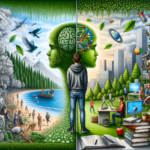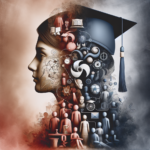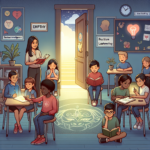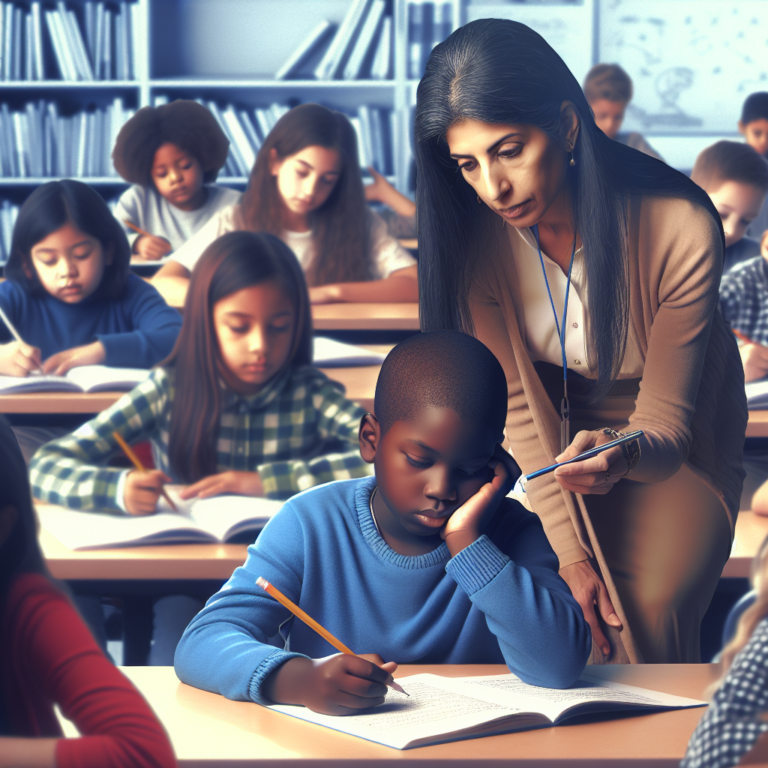
Building Bridges: Enhancing Social Skills in Children with Learning Disabilities
Introduction
Imagine a world where every child, regardless of their learning challenges, can confidently engage with their peers, express themselves authentically, and build meaningful relationships. This vision isn’t just a dream—it’s a reality achievable through the right strategies and support. In this article, we delve into Building Bridges: Enhancing Social Skills in Children with Learning Disabilities, exploring effective methods, inspiring case studies, and practical tips to foster social competence among children facing learning disabilities.
Social skills are foundational for personal development and future success, yet conventional education systems often overlook them. Children with learning disabilities frequently struggle with communication, understanding social cues, and forming friendships, which can lead to feelings of isolation and low self-esteem. Hence, enhancing these skills is not just beneficial—it is essential. Let’s explore how we can build those vital bridges.
Understanding Learning Disabilities and the Importance of Social Skills
Defining Learning Disabilities
Learning disabilities encompass a range of neurological disorders affecting one’s ability to process and retain information. Conditions such as dyslexia, ADHD, and autism spectrum disorders (ASD) can hinder reading, writing, numeracy, and social interactions. According to the National Center for Learning Disabilities, about 1 in 5 students in the U.S. has a learning disability, emphasizing the need for targeted interventions.
The Impact of Social Skills on Development
Social skills are critical not only for making friends but also for improving academic performance and emotional well-being. Children with learning disabilities often exhibit difficulties in:
- Understanding Nonverbal Cues: Body language, facial expressions, and tone of voice can be confusing.
- Initiating Conversations: Starting or participating in dialogues can feel intimidating.
- Managing Emotions: Responding to social situations can lead to frustration and behavioral issues.
Therefore, Building Bridges: Enhancing Social Skills in Children with Learning Disabilities is vital in creating a supportive ecosystem where these children can thrive.
Strategies for Enhancing Social Skills
1. Creating a Supportive Environment
Importance of Inclusivity
To promote effective social interactions, it is crucial to cultivate an inclusive environment. Schools and communities should prioritize diversity and acceptance, fostering a culture where differences are celebrated rather than stigmatized.
Case Study: Maplewood Elementary School
At Maplewood Elementary, teachers implemented an inclusive program that paired children with learning disabilities with peers for collaborative projects. The initiative not only improved students’ academic performance but also enhanced their social skills, with noticeable increases in empathy and understanding within the classroom.
| Outcomes | Before Program | After Program |
|---|---|---|
| Friendships formed | 5% | 30% |
| Participation in group activities | 20% | 65% |
2. Teaching Explicit Social Skills
Children with learning disabilities often benefit from explicit instruction on social skills. These can include:
- Conversational Skills: Role-playing different scenarios can help children practice initiating and maintaining conversations.
- Emotional Regulation: Teaching techniques like deep breathing or using "feeling charts" can help children express their emotions appropriately.
- Conflict Resolution: Enforcing strategies for resolving disagreements can empower children to navigate social dynamics effectively.
Case Study: The STAR Program
The STAR (Social Skills Training and Relationship-building) Program implemented in a middle school showed significant enhancements in students’ ability to interact socially. By integrating role-play and direct instruction, participants experienced a 40% increase in peer interactions.
3. Utilizing Visual Supports
Visual supports can be powerful tools in enhancing social skills. These might include:
- Social Stories: Simple narratives that illustrate social situations and appropriate responses.
- Visual Schedules: Help children prepare for social interactions by providing clear expectations.
- Emotion Cards: Allow children to identify and express their feelings visually.
Case Analysis: In a case where visual supports were introduced at Oak Valley School, students with learning disabilities showed a marked improvement in responding to social situations. Feedback from teachers indicated a reduction in behavioral incidents and increased participation in social activities.
Encouraging Peer Interaction
1. Buddy Systems
Implementing buddy systems can facilitate social interactions and friendships. Pairing children with learning disabilities with more socially adept peers can help them learn appropriate social behaviors in a real-world context.
Case Study: Parkside Middle School
At Parkside Middle School, trained peer mentors were paired with students who struggle socially. As a result, participating students boosted their self-esteem and companionship skills within just a semester.
2. Extracurricular Activities
Encouraging children with learning disabilities to join clubs, sports, or creative arts can provide opportunities for informal social interactions. Engaging in shared interests can help ease the pressure of social expectations.
Case Study: Creative Arts Program
A creative arts program in a local community center successfully integrated children with learning disabilities through collaborative projects, fostering friendships and encouraging teamwork. Participants exhibited higher levels of social engagement, as reported by parents.
| Program Components | Pre-Program | Post-Program |
|---|---|---|
| Initiating Play | 10% | 50% |
| Number of Friendships | 0 | 5 |
Empowering Parents and Caregivers
1. Building Home-Based Social Skills
Parents play a pivotal role in enhancing social skills at home. Techniques include:
- Organizing playdates and coaching interactions.
- Using family game nights to teach turn-taking and sharing.
- Communicating openly about emotions, using real-life examples.
2. Collaborating with Professionals
Engaging with therapists and special educators can provide families with tailored strategies. Participating in support groups can also enable parents to share experiences and learn from one another.
3. Raising Awareness and Understanding
Educating peers and their families about learning disabilities can promote empathy and allies. Workshops and community events can bring awareness, helping to reduce stigma associated with learning disabilities.
The Role of Technology
1. Social Skills Apps and Programs
Numerous applications and online platforms focus on developing social skills through interactive modules. Some popular options include:
- The Social Express: Offers scenarios and quizzes to enhance social understanding.
- Model Me Kids: Features videos demonstrating various social situations.
These digital tools provide additional, engaging ways for children to practice their skills both independently and with care providers.
2. Online Support Groups
Virtual forums offer platforms for connection among caregivers of children with learning disabilities. Sharing stories, challenges, and successes fosters community support and camaraderie.
Conclusion
The journey of Building Bridges: Enhancing Social Skills in Children with Learning Disabilities is not only crucial for the children affected but also for creating an inclusive society. By implementing supportive strategies, collaborating with peers, and utilizing resources effectively, we can empower these children to form connections that will last a lifetime.
It’s vital to remember that every child has unique qualities and strengths. By focusing on enhancing their social skills, we are not only helping them navigate the complexities of social interactions but also enriching their lives profoundly. Together, we can build bridges toward a brighter future for children with learning disabilities.
FAQs
1. What defines a learning disability?
A learning disability is a neurological disorder that disrupts a person’s ability to read, write, or process information. Common types include dyslexia, dyscalculia, and ADHD.
2. How can teachers support social skill development in the classroom?
Teachers can implement structured group activities, peer mentoring systems, and social skills training programs to facilitate positive interactions among students.
3. What role do parents play in supporting social skills?
Parents can encourage social interactions through arranged playdates, teach emotional regulation techniques, and model conversational skills in everyday situations.
4. Are there specific games that help in enhancing social skills?
Yes, games that emphasize teamwork, turn-taking, and strategy can help develop social skills. Examples include board games like "Uno" or cooperative games that require players to work together towards a common goal.
5. How do I find resources to help my child with a learning disability?
Networking with educators, joining support groups, and conducting online research can help parents identify appropriate resources and programs tailored to their child’s specific needs.
By prioritizing the enhancement of social skills, we foster resilience, confidence, and lifelong connections for children with learning disabilities—building a world where every child thrives.













